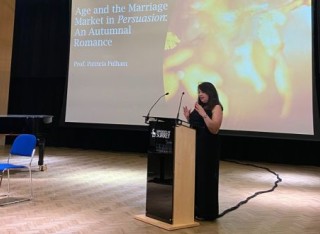
Professor Annika Bautz
About
Biography
Professor Annika Bautz joined the University of Surrey in 2023 as Pro-Vice-Chancellor and Executive Dean of the Faculty of Arts, Business and Social Sciences, home to subjects from across the arts, humanities, social and political sciences, law, economics, tourism and business.
In summer 2025, she was seconded to the role of Pro-Vice-Chancellor, Education.
Annika strives to build communities that are dedicated to the advancement of knowledge and to making a positive contribution to society, placing disciplines in the real world to demonstrate the crucial role they play in addressing some of today’s most pressing social issues. She is proud to see Surrey's subjects ranked highly across UK and international league tables, and to work with colleagues who foster an impact-focused research culture and deliver excellence in education, giving a diverse student body the skills they need for the future of work.
Areas of specialism
University roles and responsibilities
- Pro-Vice-Chancellor
- Executive Dean
- Executive Board Member
- Professor of Nineteenth-Century Literature
- Executive Board Lead for EDI and Athena Swan
My qualifications
MA Zurich
PhD Newcastle
News
ResearchResearch interests
Annika is Professor of nineteenth-century literature. Her work focuses on book history, particularly reception studies, and centres on notions of canonicity and popularity. It asks how the quantitative and qualitative receptions of authors vary across centuries and cultures as readers bring the concerns of their own times to their interactions with a text, receive them in new ways, create new interpretations and derive new meanings.
Her current monograph studies the reception of Edward Bulwer Lytton’s medieval romances for what their appeal can tell us about the receiving culture and its publishing industry, interrogating how nineteenth- and twentieth-century mentalities allowed the myths the novels contained to live on to today. Previous work considers the afterlives of Jane Austen, the diverse and changing approaches to her and her writings through the centuries, and what these approaches tell us about each receiving culture, including our own.
Research interests
Annika is Professor of nineteenth-century literature. Her work focuses on book history, particularly reception studies, and centres on notions of canonicity and popularity. It asks how the quantitative and qualitative receptions of authors vary across centuries and cultures as readers bring the concerns of their own times to their interactions with a text, receive them in new ways, create new interpretations and derive new meanings.
Her current monograph studies the reception of Edward Bulwer Lytton’s medieval romances for what their appeal can tell us about the receiving culture and its publishing industry, interrogating how nineteenth- and twentieth-century mentalities allowed the myths the novels contained to live on to today. Previous work considers the afterlives of Jane Austen, the diverse and changing approaches to her and her writings through the centuries, and what these approaches tell us about each receiving culture, including our own.






